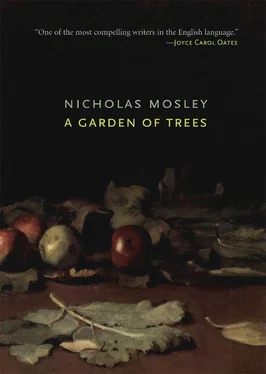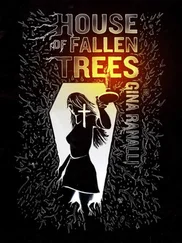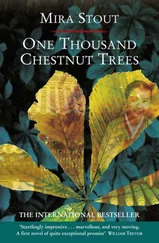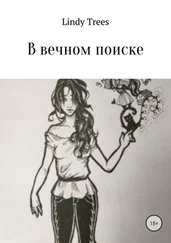Peter protests: “Annabelle, that hat is preposterous; you might be in the chorus of the Chocolate Soldier.” “They wore busbies, surely, or those cardboard things like jugs.” “Yours is like a cheese dish.” “We haven’t eaten for twelve hours,” Marius says; “Let’s go in here.”
But we don’t, we go on, to the park, perhaps, where the band is playing (Peter: “Give us a song, Annabelle, you look like Lily Langtry”); or to Lords, for the last few overs of the day (Marius: “What we want is something revolutionary, a bowler who can send the ball up very high and get it coming down vertically on the stumps”); or to Kew, for the flowers (Annabelle: “I don’t think anyone will see you if you go into the bushes”).
At Kew the flowers are out, some children are playing with a brightly coloured ball, the nursemaids are knitting beside their prams. The ball rolls to our feet, Peter picks it up (“Look out for the greenhouse”), he kicks it, it shoots up over the trees like a rocket. We spend several minutes trying to fish it out of the river, we borrow a walking-stick from an old man asleep. The children watch us, severe, reproachful. We are so much younger than they. Peter gets the ball to the edge of the river; he slashes at it, wickedly, with the stick; it disappears gracefully over the trees from whence it came. The children seize it, the old man dreams, Annabelle smells a petal from a blossom like snow.
In the park we meet friends, friends of Annabelle’s, they want us to go somewhere, they have several cars. We climb in. It is a garden-party day with garden-party people, some boats on the river, fireworks, games. Annabelle walks through the crowd like a reaper through an orchard; she is in grey, and takes her hat off, because other women are in purple and have cherries in their hair. The men are tightly waisted, carrying gloves and rolled umbrellas. The day is hot. Peter undoes more buttons as the others mop their brows. We glide away, discreetly, seeing a fair-ground in a field. Crossing over a bridge above an ornamental garden we are like willow-patterned people on a plate of painted green.
There are swing-boats, and we swing, and the earth slips sideways like the tumbling of a tray. Annabelle is above me, her hands are towards my head, the rope pulls her arms and her arms go with it, her hair is flung to the sunlight like the rising pulse of flames. She pulls, standing upright, her body is like a bird; she comes downwards, down upon me, then beneath me, as if she were drowned. The bird flies, falls to the water, she floats like a swimmer stretched laughing on the sea. As I stand up to pull, my knees touch hers, her body is like the waves upon which seagulls rest, and I am the bird.
Peter is by the cocoanut-shy. “I say, these things are stuck on with glue.” “I know, old man, but you can’t expect to win every time.” “I haven’t won once.” “I know, old man, but you’re honestly not supposed to.”
Annabelle props her elbows on the counter of a booth. She is given an air-gun, loaded. She leans forwards so that her waist is against the edge of the counter and the black band of her belt seems to cut her body in two. I stand behind her. Her dress is pulled forwards in tiny wrinkles from her armpits and her skirt curves outwards with the softness of skin. One foot is against the upright structure of the counter and the other is back with her toe just touching the ground. I can see her breathing. Then she holds her breath, and the muscle in her leg tightens, and she shoots a clay pipe from a shelf.
Peter is rotating dispassionately on the end of a chain. “Rather dull, this.” We encourage him, and he stands on his head. The machine is stopped. “Sorry, old man, but it’s strictly anti-rules.” “I say, do all you people talk like this?” “Like what, old man, but you might get a nasty flesh wound.” “Flesh wound be damned, I might get killed.”
As we go back in the cars I am alone with Annabelle. We sit looking out of our respective windows. The road passes. Time passes. We do not speak. The car is a tiny boat which has to be balanced very still. The road is dark, and the lights from other cars blind us. If only I could see into the dark, I think, and if other people did not blind me, I might not be so alone when I am alone with Annabelle.
It was at Lords, finally, watching the cricket, that I met the Australian with whom I had shared a cabin on the boat. We were standing by the tavern, and Marius and Peter were having their protracted argument about the ball that should come down vertically on the stumps. (“You could hook it.” “Not if he pitched it dead on.” “He can’t have it both ways.” “Neither can you unless you sit on the stumps.”) The Australian came out of the Tavern with a mug of beer, and he did not see me at first. He was listening to the conversation. Annabelle had now joined in. (“Why shouldn’t you sit on the stumps?” “Danger of L.B.W.” “But the umpire never could tell unless he was up in the sky like a balloon.” “No reason why he shouldn’t be.” “He might get biased in a wind.”) The Australian had his head on one side and was grinning, incredulously. He began to roll a cigarette with the quick, damp movements that I remembered so well. The talk went on. (“It all depends on getting it very high.” “It sounds to me just like your grapefruits.” “You couldn’t hook a grapefruit, not at Lords.” “You might hook a lemon at the Oval.” “Oh Marius, really, what a dreadful joke.”)
Then the Australian saw me. I detached myself from the group and greeted him. “Well,” he said, “and so you haven’t got any friends?” His gold teeth were showing, and I was glad to see him. “We were trying to find some way of beating you Australians,” I said. (“It would burst.” “Not if you glided it.” “You couldn’t glide a banana.” “If you avoided the slips.” “Oh Marius, really, what an utterly dreadful joke.”) “You certainly have got some friends,” said the Australian. “Yes,” I said. (“You might pull a plum.” “Like Little Jack Horner.” “Would that be L.J. Horner, Sydney, second test?”) “Yes that would be Christmas,” said the Australian, joining in. I introduced him. “He must have been quite young at the time,” Marius said. “Yes that was the game when Old King Cole was called on to bowl,” said the Australian, leaning back on his heels and roaring with laughter.
The Australian was a great success. He said that Annabelle was a corker, Marius sharp, and Peter dry. He called Peter’s bluff, and outwitted him in complexities. With Marius he got involved in a discussion on the cultivation of fruits. We never knew when he was serious. He paid Annabelle elaborate compliments, and we drank a lot of beer. He played our game like a professional — one of those new-world professionals who take sport so devoutly. As we talked with him and followed him through the maze of his serious jokes, in spite of the laughter and the success of the day, I had the impression that we were only amateurs at this sport, that we would never make a business of it as he did; and after we left him it seemed we could retire unhurt. And just before we parted he came over and said to me, grinning all golden with his teeth: “And you said that you hadn’t got a girl.”
8
So, in a playground, as children, we waited; there was talk but no action because there was nothing to do. In the playground there was no responsibility, no conflict — it was a small enclosed existence in a corner shut off from the world. The sun shone and we did not look over the railings. We thought we knew about love because Marius had talked about love, we thought we moved in awe of our secrets because they were secret: but our emotions, however real they appeared, were emotions of the imagination. We created our rituals — the swings, the see-saws, of the children’s mind — but they were symbols which went no further than the confines of our waiting. We remembered our words; we thought we saw a tragedy here, a reflection there, eternity in our secrets; but so long as they remained words and not actions they had little relevance to living. Enclosed thus we could have continued but for the prevalence of time. Time came in, like a nursemaid, with the demands of reality; and on a summer morning Marius asked me if I would like to see his wife.
Читать дальше












